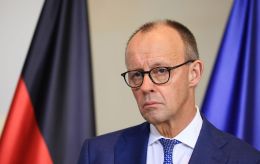EU fails to cope with Russian propaganda flow via Telegram - Bloomberg
 Photo: Telegram has become the Kremlin's key weapon for propaganda
Photo: Telegram has become the Kremlin's key weapon for propaganda
The Russian messenger Telegram has become a key weapon of pro-Kremlin accounts in spreading disinformation aimed at undermining support for Ukraine in the EU. Recently, Russian intelligence officials have used it to recruit petty criminals to carry out sabotage in European capitals, Bloomberg reports.
This is causing dissatisfaction among European officials, who have made the fight against fake news their top priority ahead of the continental elections in June. Despite all their new powers to regulate information on the Internet, they are virtually powerless to restrict Telegram.
"Disinformation is spreading openly and completely unchecked on Telegram," Estonian Prime Minister Kaja Kallas told Bloomberg.
Requests to remove disturbing content often go unanswered, she said: "We know that other member states have similar problems."
Fake news
A typical pro-Russian propaganda campaign relies on a flurry of online techniques. These include posts on social media, articles in state media, fabricated news that mimics the look and feel of legitimate websites, and anonymous comments on real ones.
Telegram functions as a central node in this ecosystem, a kind of bridge that propaganda groups use to distribute their content to active social communities to reach a wider audience.
"Telegram is popular among various pro-Russian actors as well as individuals who have been spreading disinformation for a long time because there is almost no content moderation," said Daniel Milo, former director of the Center for Countering Hybrid Threats at the Slovak Interior Ministry. "The rules of Telegram in this regard are very, very lax."
EU rules
The EU has recently stepped up its powers to combat illegal and harmful content to prevent malicious actors from spreading disinformation ahead of the European elections.
But when it comes to Telegram, these measures are not very effective - effective tools can only be applied to platforms with more than 45 million active users in Europe. Telegram, according to its owners, has 41 million.
According to Kallas, these figures do not reflect the whole picture, and "the European Commission should conduct an independent evaluation," she says.
For large platforms, the EU can levy fines of up to 6% of annual sales if it finds violations, or ban repeat offenders from entering the EU. These rules apply to Facebook, YouTube, and TikTok, among others.
Smaller platforms are subject to national agencies where companies have legal representation. In the case of Telegram, it is Belgium. However, national authorities have limited powers to take action.
According to Kallas, if Telegram were recognized as a "very large online platform" under the DSA, it would be obliged to take measures against the spread of disinformation and introduce stricter content moderation protocols. "It would also ensure a level playing field within the internal market, as other platforms have taken significant efforts to comply with the Digital Services Act," the Estonian Prime Minister adds.
According to an internal EU assessment seen by Bloomberg, the main themes of Russia's disinformation efforts are the war against Ukraine, the conflict in the Middle East, immigration, climate change, and the upcoming European Parliament elections.
The number of messages from unverified sources across all platforms on these five topics has more than doubled since the beginning of May, compared to less than 20,000 messages per day at the beginning of the year.
Yaroslav Yurchyshyn, chairman of the Verkhovna Rada's Committee on Freedom of Speech, did not rule out that information from Telegram is being passed on to the Russian secret services. According to him, Ukraine may block Telegram if the information leak is confirmed.
Telegram was founded in August 2013 by Pavel Durov, a Russian entrepreneur who is also the founder of the social network VKontakte. Telegram's monthly audience has exceeded 900 million users.

